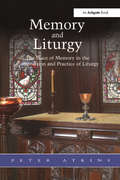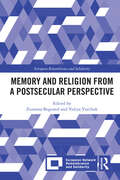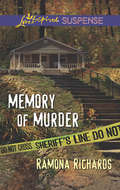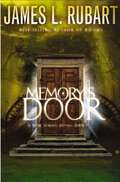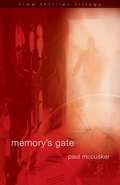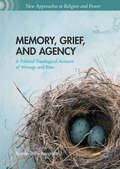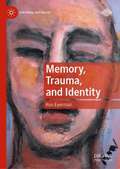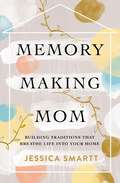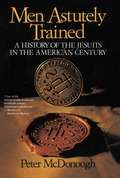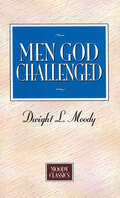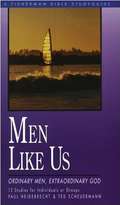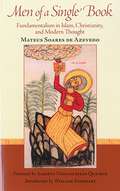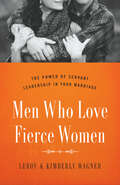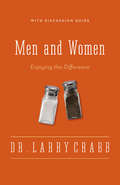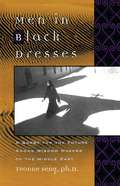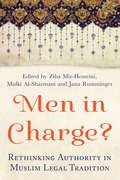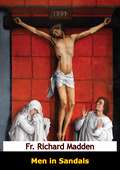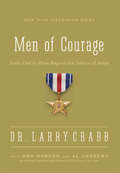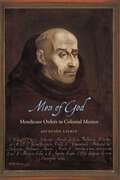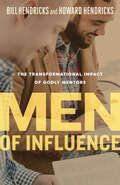- Table View
- List View
Memory and Liturgy: The Place of Memory in the Composition and Practice of Liturgy (Liturgy, Worship And Society Ser.)
by Peter AtkinsMemory is a major factor in the composition and practice of liturgy. Recent research into how the brain and memory function points the way to how liturgy can best meet the needs of worshippers. In Memory and Liturgy, Peter Atkins draws on the fruits of his research into the process of the brain and our memory and applies it to liturgical worship. His extensive experience in writing and using liturgy keeps this book rooted in reality. In its ten chapters the author applies the functioning of the brain and the memory to our remembrance of God in worship; God's memory of us through Baptism; our remembrance of Jesus Christ in the Eucharist; the corporate memory of the community created through worship; the healing of memories of sin and pain through forgiveness; three aids to help us worship; the process of continuity and change in liturgy; and the connection between memory, imagination and hope. The conclusion summarizes the main practical issues. This provides a check-list for those serving on Liturgical Commissions and those involved in the teaching of the practice of liturgy. This book is a positive contribution to the ongoing search for suitable liturgical worship and music for the 21st century.
Memory and Religion from a Postsecular Perspective (European Remembrance and Solidarity)
by Zuzanna Bogumił Yuliya YurchukThe book argues that religion is a system of significant meanings that have an impact on other systems and spheres of social life including cultural memory. The editors call for a postsecular turn in memory studies which would provide a more reflective and meaningful approach to the constant interplay between the religious and the secular. This opens up new perspectives on the intersection of memory and religion and helps memory scholars become more aware of the religious roots of the language they are using in their studies of memory. By drawing on examples from different parts of the world, the contributors to this volume explain how the interactions between the religious and the secular produce new memory forms and content in the heterogenous societies of the present-day world. These analysed cases demonstrate that religion has a significant impact on cultural memory, family memory and the contemporary politics of history in secularized societies. At the same time, politics, grassroots movements and different secular agents and processes have so much influence on the formation of memory by religious actors that even religious, ecclesiastic and confessional memories are affected by the secular. This volume is ideal for students and scholars of memory studies, religious studies and history.
Memory of Murder
by Ramona RichardsThe secrets of her past could imperil her futureLindsey Presley certainly can't imagine why anyone would want her dead-though she knows she wouldn't be alive today if not for the local cop who saved her from two murder attempts. Deputy Jeff Gage has worked difficult cases, but with only Lindsey's fractured memories of a broken past to guide him, this is by far his most challenging. For Lindsey, fleeing the town she has come to call home is unthinkable. Separately, they are vulnerable, but together, Jeff and Lindsey just may stand a chance of catching a ruthless killer.
Memory's Door (A Well Spring Novel #2)
by James L. RubartThe prophecy brought them together. But the Wolf has risen, andnow their greatest battle begins.The fourmembers of Warriors Riding have learned to wage war in the supernatural, tosend their spirits inside people's souls, to battle demonic forces, and tobring deep healing to those around them.But theirleader Reece is struggling with the loss of his sight. Brandon is being stalkedat his concerts by a man in the shadows. Dana's career is threatening to buryher. And Marcus questions his sanity as he seems to be slipping in and out ofalternate realities.And nowthe second part of the prophecy has come true. The Wolf is hunting them and hasset his trap. He circles, feeding on his supernatural hate of all they standfor. And he won't stop until he brings utter destruction to their bodies . . .and their souls.". . .thisis a seriously heart-thumping and satisfying read that goes to the edge, jumpsoff, and 'builds wings on the way down.'"--Publishers Weekly review of Soul'sGate
Memory's Gate
by Paul MccuskerThe Time Thriller Trilogy delivers gripping, fast-paced mystery that intrigues and captivates through hours, seconds, and centuries. A long history of strange disappearances and unexplainable occurrences leave clues that the town of Fawlt Line may actually sit on a time fault—a portal to alternate times and unexpected time travels—a twist of fate that puts all of Fawlt Line’s citizens in serious danger. Will they find the faith to hold on to the town and time where they belong? Can truth prevail? Elizabeth thought volunteering at the Fawlt Line Retirement Center would be fun, but she quickly has second thoughts. While most of the residents are wonderful, there’s something about the place—and a strangely familiar man in a wheelchair—that gives her the creeps. When people start disappearing from the center, leaving behind cryptic notes, Elizabeth is convinced the time fault is involved. Her own time-travel adventure may be the key to solving the mystery, but can she convince the sheriff she’s telling the truth before more people disappear?
Memory, Grief, and Agency
by Sunder John BoopalanThis book argues that an active memory of and grief over structural wrongs yields positive agency. Such agency generates rites of moral responsibility that serve as antidotes to violent identities and catalyze hospitable social practices. By comparing Indian and U. S. contexts of caste and race, Sunder John Boopalan proposes that wrongs today are better understood as rituals of humiliation which are socially conditioned practices of domination affected by discriminatory logics of the past. Grief can be redressive by transforming violent identities and hostile in-group/out-group differences when guided by a liberative political theological imagination. This volume facilitates interdisciplinary conversations between theorists and theologians of caste and race, and those interested in understanding the relation between religion and power.
Memory, Trauma, and Identity (Cultural Sociology)
by Ron EyermanThis volume brings together Ron Eyerman’s most important interventions in the field of cultural trauma and offers an accessible entry point into the origins and development of this theory and a framework of an analysis that has now achieved the status of a research paradigm. This collection of disparate essays, published between 2004 and 2018, coheres around an original introduction that not only provides a historical overview of cultural trauma, but is also an important theoretical contribution to cultural trauma and collective identity in its own right. The Afterword from esteemed sociologist Eric Woods connects the essays and explores their significance for the broader fields of sociology, behavioral science, and trauma studies..
Memory-Making Mom: Building Traditions That Breathe Life Into Your Home
by Jessica Smartt<p>Be a different kind of mom. Break through the distractions and create lasting memories. <p>What’s the solution to gaining the balanced, meaningful life you desire with your family? Create traditions that bring joy and significance. Popular "Smartter Each Day" blogger and mom of three, Jessica Smartt explains why memory-making is the puzzle piece that today’s families are longing for. She highlights the tradition-gifts kids need most with 300+ unique traditions including: <p> <li>Food: Memories That Stick to Your Ribs <li>Holidays: Fall Bucket Lists, Crooked Christmas Trees, and Lingering Over Lent <li>Spontaneity: Let's Go on an Adventure <li>Faith: Why You Need the Puzzle Box </li> <p> <p>She also offers practical encouragement to modern parents to keep on adventuring—even when they are fighting distractions, are on a budget, and exhausted.</p>
Men Astutely Trained: A History of the Jesuits in the American Century
by Peter McdonoughA perceptive and provocative analysis of the transformation that swept through American Catholicism in the decades leading up to Vatican II. Captures the drama of the Jesuits confrontation with American modernity. Jokers, wisemen, failures, the brilliant and the merely bemused march through the book's pages. The Jesuits have been the carriers of a culture borne along by a fruitful and often frustrating tension between their dual commitment to ancient virtues and to the pursuit of the free play of ideas. Explains developments among the Jesuits and sets them in the larger context of the sea-changes that shook the world and the Catholic Church in the world during the mid-20th century.
Men God Challenged: Moody Classics Series (Moody Classics)
by Dwight L. MoodyHow many years has it been since you first heard the story of Daniel in the lions' den? Do you think of it merely as a child's story, one with little application for today? Almost one hundred years ago, D.L. Moody sketched the lives of Daniel and others, drawing applications to his day. Their relevance today is startling. Here again are Mr. Moody's insightful sketches of men God challenged, including:DanielEnochLotJacobJohn the Baptist
Men Like Us: Ordinary Men, Extraordinary God (Fisherman Bible Studyguide Series)
by Paul Heidebrecht Ted ScheurmannMen Like Us presents 13 studies for individuals and groups.
Men Of A Single Book: Fundamentalism In
by Mateus Soares AzevadoIn this groundbreaking work, award-winning Brazilian journalist Azevedo presents a frank and objective account of how the label of fundamentalism can be applied to religious and secular 'faiths' alike. In the 21st century, passionate and emotional attachment to a single point of view, and the rejection of all others, has become one of the main social, political, and religious issues, leading to conflicts around the globe.
Men Who Love Fierce Women: The Power of Servant Leadership in Your Marriage
by Kimberly Wagner Leroy Wagner&“Five years into &‘wedded bliss,&’ I confessed to Kim that I no longer loved her. We were stuck in a destructive relationship pattern we now refer to as the &‘fierce woman/fearful man&’ cycle, and I had lost all hope for a peaceful marriage…&” — LeRoy WagnerWhat if I&’m laid-back and my wife is… not? How can I lead when I feel emasculated? I&’m not sure I love my wife anymore. What happened?If you find yourself asking questions like these, LeRoy can relate. In Men Who Love Fierce Women, he is gut-honest about his failures and frustrations as a husband, the realizations that saved his marriage,* and the requirements God places on every husband, laid-back or not. With their insights combined, Kim and LeRoy equip men to rise up, handle conflict, love their wife, and lead their marriage, regardless of who has the stronger personality.Includes reflection questions at the end of every chapter, plus an appendix for addressing conflict. *Kim and LeRoy&’s interview on Focus on the Family, in which they discuss their marriage and Kim&’s book Fierce Women, aired twice and was voted the #1 segment of 2015, prompting the publication of this book.
Men Who Love Fierce Women: The Power of Servant Leadership in Your Marriage
by Kimberly Wagner Leroy Wagner&“Five years into &‘wedded bliss,&’ I confessed to Kim that I no longer loved her. We were stuck in a destructive relationship pattern we now refer to as the &‘fierce woman/fearful man&’ cycle, and I had lost all hope for a peaceful marriage…&” — LeRoy WagnerWhat if I&’m laid-back and my wife is… not? How can I lead when I feel emasculated? I&’m not sure I love my wife anymore. What happened?If you find yourself asking questions like these, LeRoy can relate. In Men Who Love Fierce Women, he is gut-honest about his failures and frustrations as a husband, the realizations that saved his marriage,* and the requirements God places on every husband, laid-back or not. With their insights combined, Kim and LeRoy equip men to rise up, handle conflict, love their wife, and lead their marriage, regardless of who has the stronger personality.Includes reflection questions at the end of every chapter, plus an appendix for addressing conflict. *Kim and LeRoy&’s interview on Focus on the Family, in which they discuss their marriage and Kim&’s book Fierce Women, aired twice and was voted the #1 segment of 2015, prompting the publication of this book.
Men Who Met God: Twelve Life-Changing Encounters
by A. W. TozerA. W. Tozer's Men Who Met God is a compelling survey of seven biblical figures who had the tremendous experience of walking and communing with God in some fashion—in the coolness of the afternoon, through a burning bush, in personal discussion, or by another divinely inspired method.Originally preached as a series of sermons by A. W. Tozer at Southside Alliance Church in Chicago, this compilation enlightens the mind and cuts to the heart in the way we&’ve come to expect from Tozer.May you be moved toward God as you see how men of old encountered his Awesome Presence.
Men Who Met God: Twelve Life-Changing Encounters
by A. W. TozerA. W. Tozer's Men Who Met God is a compelling survey of seven biblical figures who had the tremendous experience of walking and communing with God in some fashion—in the coolness of the afternoon, through a burning bush, in personal discussion, or by another divinely inspired method.Originally preached as a series of sermons by A. W. Tozer at Southside Alliance Church in Chicago, this compilation enlightens the mind and cuts to the heart in the way we&’ve come to expect from Tozer.May you be moved toward God as you see how men of old encountered his Awesome Presence.
Men and Women: Enjoying the Difference
by Larry CrabbIn Men & Women, bestselling author Dr. Larry Crabb maintains that men and women are different in important ways that, if understood and honored, can lead to a deep enjoyment of one another—an enjoyment that can last forever. What does it take to get along for a lifetime? According to Crabb, men and women share a deadly problem that kills good relating. The problem is this: we are committed, first of all, to ourselves. Each of us, without blushing, holds fast to an overriding concern for our own well-being. Sharing people’s stories and personal anecdotes, Crabb explores how we can turn away from ourselves and toward each other, becoming what he calls "other-centered." What does it take to get along for a lifetime? Men and women share a deadly problem that kills good relating. The problem is this: we are committed, first of all, to ourselves. Each of us, without blushing, holds fast to an overriding concern for our own well-being. Sharing people’s stories and personal anecdotes, Crabb explores how we can turn away from ourselves and toward each other, how we can become what he calls "other-centered." In Men & Women, Dr. Crabb maintains that men and women are different in important ways that, if understood and honored, can lead to a deep enjoyment of one another, an enjoyment that can last forever.
Men at Leisure
by Bruce FredericksonGodly Man series/examines men at leisure from Biblical perspective
Men in Black Dresses
by SengIf we pause long enough, we can hear, above the din of our planet's rapid globalization and technological advancement, the quiet voices of spiritual leaders from ancient faiths. Middle East historian Yvonne Seng asks, What can these modern Desert Fathers with their long history of survival advise us on the future of our planet? Her intellectual quest rapidly becomes a personal journey that turns her Western training and perceptions on their head. Men In Black Dresses takes the reader behind the walls of desert monasteries, Sufi enclaves, ancient cathedrals and mosques -- where the author knocks, uninvited, and waits for the wise men to allow her in. Once inside, they discuss the universal concerns of the environment and the Internet, the building of a global community, and the education of coming generations, as well as the state of the human spirit.
Men in Charge?: Rethinking Authority in Muslim Legal Tradition
by Mulki Al-Sharmani Jana Rumminger Ziba Mir-HosseiniBoth Muslims and non-Muslims see women in most Muslim countries as suffering from social, economic and political discrimination, treated by law and society as second-class citizens subject to male authority. This discrimination is attributed to Islam and Islamic law, though it varies considerably in its impact, according to both class and region. Since the late 19th century there has been a mass of literature tackling this issue, some from a feminist or human rights perspective, some taking the form of an apology for Islamic law.Recently, exciting new feminist research has been challenging gender discrimination and male authority from within Islamic legal tradition, and this book presents some important results from that research. The contributors all engage critically with two central juristic concepts, rooted in the Qur'an, that lie at the basis of this discrimination, concepts which place women under male authority. One refers to a husband's authority over his wife, his financial responsibility towards her, and his superior status and rights. The other is male family members' right and duty of guardianship over female members (e.g., fathers over daughters when entering into marriage contracts) and the privileging of fathers over mothers in guardianship rights over their children.The contributors, scholars from different disciplines and backgrounds, were brought together by Musawah (Arabic for equality), a global movement for equality and justice in the Muslim family, launched in 2009. Musawah aims at producing new knowledge to help build grass-roots movements and to mobilize for change.
Men in Sandals
by Fr. Richard MaddenThis, to put it bluntly, is a book about Discalced Carmelites. I write about them because, although people are interesting, Discalced Carmelites are more interesting than people. I write about them, too, because I know more about this subject than I know about any other.This book is not an analysis of their sanctity. It is not an insight into the deep recesses of their spiritual life. Nor can it, in any way, be classified as Carmelite literature because it falls far short of the high standards set by our holy parents, St. Teresa of Avila and St. John of the Cross. This book is simply an effort to convey the fact that, although religious life may not always be easy, there is nothing quite so satisfying. It is not a dreary thing. It is not a world wherein somber, brown-robed men straggle through dingy vaulted corridors. It is not a life of long faces and sad hearts. Rather, it is a kingdom that rarely feels the draughts of true sorrow. Lived with, and in imitation of Christ, it could only be, even in its essence, a life of honest joy.
Men of Courage: God’s Call to Move Beyond the Silence of Adam
by Larry Crabb Al Andrews Don Michael HudsonMen today have locked horns with their toughest issue: reclaiming the full potential of manhood. Bestselling author Dr. Larry Crabb asks, What gives manhood definition and meaning? In this updated and expanded edition of The Silence of Adam, Crabb and his colleagues, biblical scholar Don Hudson and counselor Al Andrews, offer a fresh look at how God designed men. The book deals thoughtfully and honestly with men's ongoing struggles and exposes the difficulties they have in relationships. It presents the rich calling men have to reveal God in ways uniquely masculine. And it summons them beyond their paralyzing fear of failure to bold risk-taking, courageous action, deep spirituality, and full-hearted living. This new edition includes: Epilogue from Dr. Larry Crabb Study Guide (Individual or Group Format Use)
Men of God: Mendicant Orders in Colonial Mexico (Confluencias)
by Asunción LavrinA broadly researched cultural history, Men of God offers a path to understanding the concept of religious masculinity through an intimate approach to the study of friars and lay brothers in colonial Mexico. Though other scholars have focused on the missionary work of the Augustinian, Franciscan, and Dominican friars, few have addressed their everyday lives and how the internal discipline of their orders shaped them. In Men of God Asunción Lavrin offers a sweeping yet intimate history of the mendicant friars in New Spain from the late sixteenth through the eighteenth centuries. Focusing on these individuals&’ lives from childhood through death, Lavrin explores contemporaneous ideas, from how to raise a boy to the friars&’ training as novices, and the similarities and differences in the life experiences of lay brothers and ordained members. She discusses their sexuality to reveal the challenges and failures of religious manhood, as well as the drive behind their missionary duties, especially in the late seventeenth through the eighteenth centuries. Men of God also explores the concepts and realities of martyrdom and death, significant elements in the spirituality of the mendicant friars of colonial Mexico.
Men of Influence: The Transformational Impact of Godly Mentors
by Howard Hendricks Bill HendricksWere it not for ____________, I wouldn&’t be who I am todayMen have a way of rubbing off on one another—for better or worse. You will be influenced and you will influence, especially when you have regular one-on-one interactions with another man. Be intentional and become the man God made you to be, while learning to change other men&’s lives for the better. Men of Influence teaches you the importance of mentoring, how to find a good mentor, and what you can offer others as a mentor (even if you don&’t feel qualified). Learn: how to approach a mentor without scaring him off what to expect at the beginning, middle, and end of a mentoring relationshipwhat you have to offer to another man People change one person at a time. Realize your full potential and help others do the same through the simple practice of mentoring.
Men of Influence: The Transformational Impact of Godly Mentors
by Howard Hendricks Bill HendricksWere it not for ____________, I wouldn&’t be who I am todayMen have a way of rubbing off on one another—for better or worse. You will be influenced and you will influence, especially when you have regular one-on-one interactions with another man. Be intentional and become the man God made you to be, while learning to change other men&’s lives for the better. Men of Influence teaches you the importance of mentoring, how to find a good mentor, and what you can offer others as a mentor (even if you don&’t feel qualified). Learn: how to approach a mentor without scaring him off what to expect at the beginning, middle, and end of a mentoring relationshipwhat you have to offer to another man People change one person at a time. Realize your full potential and help others do the same through the simple practice of mentoring.
